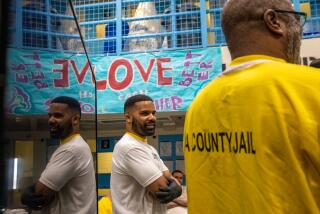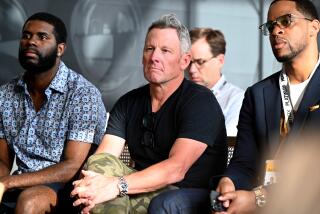The Valuable Lesson of Lance Armstrong
- Share via
“I’ll be honest with you,” Lance Armstrong said to me once, “I don’t wake up every morning thinking, ‘I want to be an inspiration to somebody today.’ ”
The next time I see Lance, he’ll probably be sitting on the porch of his favorite home, a one-room cabin overlooking his Austin, Texas ranch, wearing a T-shirt, jeans and flip-flops, and a two-day growth on his chin. He’ll be drinking a Shiner Bock beer while he watches his kids roll down a hill of rich grass that he planted for that purpose, and I’ll stare at him, and try to reconcile the regular guy I know with the heroic, iron-faced figure who’s now won the Tour de France five times.
As Lance’s co-author on a couple of autobiographies, I’ve been inside his homes and explored the thoughts in his head and become a fairly good friend, and the longer I know him, the more important it seems to me to look hard at him, and understand who he is, and where his real value lies.
Lance, of course, has extraordinary physical gifts. Not everybody can ride through Pyrenees, bleeding, on a broken bike, and win. But ordinary people can survive cancer, as he did, and in fact do so every day. So how to separate what parts of Lance are extraordinary idiosyncrasies, and therefore impossible to emulate, and which parts are ordinary qualities and therefore available to you and me, if we would only learn to draw on them?
I only know partial answers to these questions, and to the general mystery of his character. All I can do is try to tell people that his great gifts on a mountainside don’t necessarily transfer, automatically, into making him a better man, and what I like about him so very much is that he knows this. He is suspicious of his own specialness.
He’s a more lighthearted character than people might imagine. He can kid around or cuss in at least five languages, including Dutch, Spanish, and Italian. He can mimic the actor Philip Seymour Hoffman, and the mechanical warning voice in an airplane cockpit.
Once, when we were flying on a small plane, we hit some turbulence. While I gripped my armrest, he intoned, “Pull up. Pull up.” I giggled helplessly.
Last summer he grew a beard because he was sick of living such an austere life, always training and unable to eat the Tex-Mex food he craves, or even a dish of ice cream. I gazed at his chin, and said, “What are you doing that for?”
“Hey,” he said, “it’s all I’ve got.”
But after a few weeks of teasing and being called Chewbacca by his friends, he decided to shave. He went into the bathroom and got out his razor. After a few minutes, his wife, Kik, heard him yell.
“Damn it!” he hollered. “It happened again!”
Kik went running to the bathroom. “What?”
“I just got better looking,” he said, smiling beatifically.
But the thing I’ve always liked best about him is that he doesn’t mind showing weaknesses or imperfections. To this day, the picture on his driver’s license is the one he had taken during chemo, in which he is bald and has no eyebrows. He has a fundamental lack of vanity that I suppose is a result of having been so exposed during his illness, of having his organs, his chest, abdomen, brain and his very bones X-rayed and held up on light tables. Those scans were the pictures of a weak and ailing man: He was scarred up in places and missing a thing or two. When he recovered from the illness, some essential reserve was gone as well.
Five years ago, shortly after he won his first Tour, he sat for a session with photographer Annie Leibowitz. She showed him the setup for the portrait: he would be hunched over a bike with a stormy backdrop. Lance surveyed the set, and remarked it looked fine, except he’d been photographed that way before.
Leibowitz thought about that, and then said, “What if you did it naked?”
“Whoa,” Lance said.
Leibowitz produced a flesh-colored stocking and said he could wear it if would make him more comfortable. Lance went to a dressing room and pulled it on. And then he took it off.
“Well, look,” he said, “if we’re going to do this thing, let’s do it right.”
But there’s a ferocity in Lance, too, and that’s the part I know least well, and continually struggle to understand. He had a combative boyhood. He was the determined only son of a determined single mother, Linda, who worked her way up from supermarket checkout girl to business executive. “Lance was a survivor long before he had cancer,” she says. As a teen-ager, he once crossed the finish line on an old track in Dallas swinging his fists at another rider.
In the midst of his fight for his life, when he awoke from surgery to remove two cancerous tumors from his brain, he murmured to his friend and trainer Chris Carmichael, “I like it this way. I’ve never known it any other way.” The next time he awoke, a couple of hours later, he tried to get out of bed. The nurses had to push him back down.
He fought like that on the climb up Luz-Ardiden to victory in the Pyrenees, after crashing last week. The thing you can’t know about Lance on a climb, until you’ve seen him do it in person, is that the effort is so severe that his eyes become completely bloodshot from burst capillaries.
“Why do you do it?” I asked him once. “What’s the pleasure in riding a bike up a mountain for six hours?”
“I don’t understand the question,” he said.
“Well, there has to be some pleasure in it,” I said. “I mean, your back hurts, your neck hurts, your butt hurts. What’s the payoff?”
“I still don’t understand the question.”
I went away baffled -- and convinced that unless I could get him to talk to me on the subject, I’d never understand him. After a couple of days of thought, I realized I’d been asking the entirely wrong question.
“You don’t do it for the pleasure,” I said. “You do it for the pain.”
“That’s exactly right,” he said.
One minute, after nearly a month of suffering, he decided who won this Tour. Lance’s ride into the history books was an essay in overcoming a succession of miseries and setbacks. He says he knew it was going to be a hard race when, the day before it began, a bird soiled the shoulder of his jersey. He got a stomach virus from his small son. He developed tendinitis in his hip. He rode a climb called the Galibier with his back brake dragging against the wheel because of a mechanical problem. He crashed twice. He got back up and rode through it all, while his competitors crashed and faded around him. What it might have amounted to in the end is that Lance felt, as race announcer Phil Liggett said, “The magnetism of a finish line.”
More to Read
Go beyond the scoreboard
Get the latest on L.A.'s teams in the daily Sports Report newsletter.
You may occasionally receive promotional content from the Los Angeles Times.










